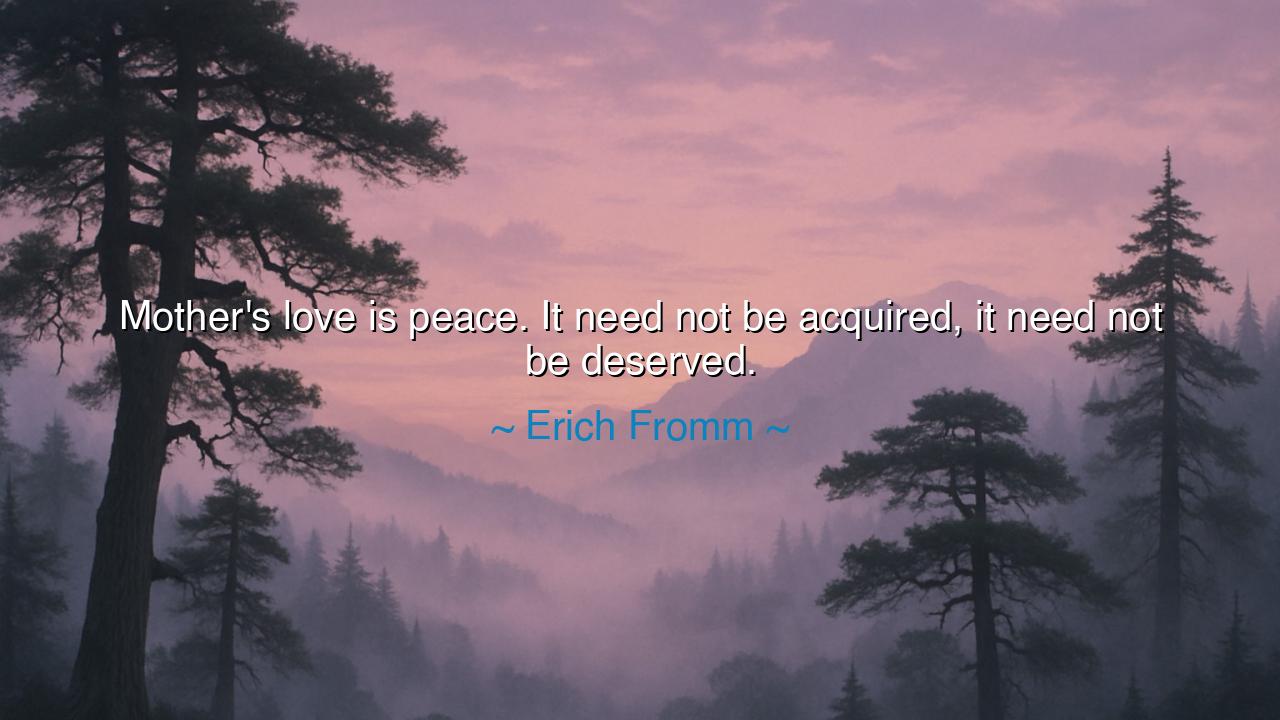
Mother's love is peace. It need not be acquired, it need not be






“Mother’s love is peace. It need not be acquired, it need not be deserved,” wrote Erich Fromm, the great philosopher and psychoanalyst who sought to understand the heart of human existence. These words, though gentle as a whisper, carry the depth of oceans. In them, Fromm reveals a sacred truth: that a mother’s love is the first and purest form of unconditional love known to humankind — a love that asks for nothing, that gives without expectation, that shelters the soul without question. It is peace, not because it is quiet, but because it is whole — complete in itself, untouched by judgment or merit.
The origin of this quote lies within Fromm’s timeless work, The Art of Loving, written in 1956 — a meditation on love as the highest act of human maturity. In his exploration, Fromm distinguishes between the many forms of love: romantic, brotherly, self-love, and parental love. Of these, motherly love stands apart, for it is not earned by achievement nor withdrawn by failure. The infant does not labor to be loved; he is loved simply because he is. In this way, the mother becomes the first symbol of divine grace — a mirror of the love that sustains life itself. Fromm understood that all of humanity’s longing for peace, for belonging, for God, begins with this primal experience of being loved without condition.
To say that mother’s love is peace is to say that it is the one place where the soul finds rest. It is the cradle of existence — the silent assurance that we belong, even before we understand belonging. In a world where nearly everything must be earned — wealth, respect, power — a mother’s love stands as a sanctuary untouched by transaction. It does not say, “I will love you if you are good.” It says, “I love you because you are mine.” Such love is not blind to fault, but it forgives it before it is even spoken. It is a love that heals, that endures, that asks nothing but the chance to give.
History, too, offers countless examples of this sacred truth. Consider Mary, the mother of Jesus, who stood at the foot of the cross as her son suffered. She could not save him from his destiny, but she did not turn away. Her love did not waver with his pain, nor fade with his death. It was peace — not the peace of comfort, but of steadfastness, the peace that holds through the storm. So too with all mothers who have waited by the bedside of a sick child, who have labored in silence, who have loved through worry, failure, and loss. Their peace is not born of ease, but of devotion — the stillness of love that abides through every trial.
Fromm’s insight is not merely sentimental; it is profoundly psychological and spiritual. He understood that the way a person experiences love in early life shapes the entire architecture of the heart. The child who knows the peace of unconditional love learns to trust, to create, to love others. The one who is deprived of it spends a lifetime seeking what he cannot name — searching for peace in power, affection, or approval. Thus, Fromm reminds us that the mother’s love is not only tenderness; it is the foundation of all human security and faith. It teaches the soul that it is worthy of love simply by existing — and this is the beginning of every other form of love.
And yet, even this divine love can be misunderstood. A mother’s love that smothers or clings ceases to be peace and becomes possession. Fromm warns that true maternal love must give both roots and wings — that it must one day release what it has nurtured. To love without condition is also to trust the freedom of the beloved. The highest form of motherly love is not endless protection, but peaceful letting go — the confidence that the seed once planted will grow strong on its own.
So, what lesson shall we, the heirs of this truth, take to heart? It is this: Love without condition, wherever you can. Be the peace that does not need to be earned. Offer kindness not as reward, but as reflection of your own fullness. In every friendship, every marriage, every bond, seek to mirror that same maternal grace — that love which gives freely and forgives quickly, that sees not with judgment but with understanding. For in a world torn by ambition and fear, such love is the only peace that endures.
And when you look upon your own life — your mother, your children, or those who have mothered your spirit — give thanks for that quiet, selfless love that asked nothing in return. Cherish it, emulate it, and pass it on. For as Erich Fromm teaches, true love is not acquired nor deserved — it simply is. And in that being, it grants to the human heart what it has sought since the dawn of time: peace.






AAdministratorAdministrator
Welcome, honored guests. Please leave a comment, we will respond soon